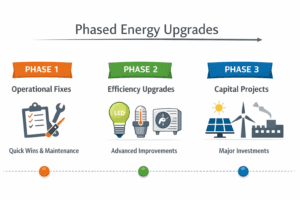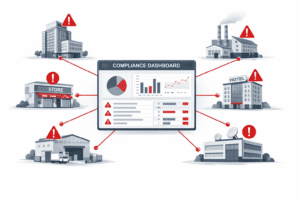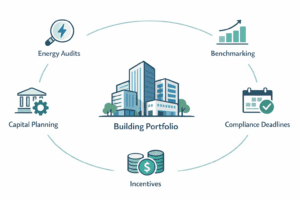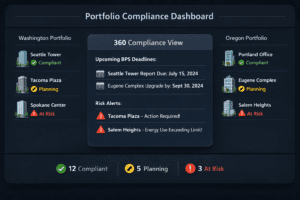Introduction
The digital evolution of Construction Project Management has brought a revolution to the industry, with technology becoming a fundamental aspect of project execution and management. As the industry transitions from paper-based processes to sophisticated software solutions, the issue of cybersecurity in construction has become increasingly critical. This shift has led to a proliferation of digital data that is vulnerable to cyber-attacks, making it paramount for companies to address cybersecurity risks with diligence and strategic planning.
The Digital Landscape and Cybersecurity in Construction

The construction industry’s digital landscape is vast, incorporating everything from project management software and drones to 3D printing and Building Information Modeling (BIM). These digital tools have streamlined project delivery and fostered collaboration, but they have also created new vulnerabilities. Cyber threats have become a significant concern, with incidents such as data breaches and ransomware attacks spotlighting the sector’s security gaps. The impact of these incidents can have far-reaching consequences, affecting not only the immediate project but also potentially leading to financial loss and damage to reputation.
Cybersecurity’s Role in Construction Project Management
In Construction Management, the role of cybersecurity extends beyond protecting information technology assets—it encompasses securing the entire operational process. Any disruption in the flow of accurate data can lead to costly delays and affect decisions that are vital to project success. The digitalization of the construction process also means that compliance with data protection and privacy regulations, such as GDPR, is a critical concern that must be addressed to maintain trust and avoid penalties.
Risk Identification in Cybersecurity for Construction Projects
Project managers must contend with a range of cybersecurity risks, from threats like phishing and malware to vulnerabilities in software and hardware. The emergence of IoT devices in construction, such as sensors and smart machinery, increases the potential attack surface. Construction Risk Management must evolve to match these challenges, with project managers taking an active role in identifying and addressing these risks.
Building a Cybersecurity Risk Management Framework
A robust Cybersecurity Risk Management Framework provides the blueprint for protecting against digital threats. Adhering to standards such as NIST’s Cybersecurity Framework can help construction firms establish the policies, procedures, and controls necessary to protect their digital assets. This framework should be comprehensive, covering not only the technological aspects but also the people and processes that interact with the company’s digital infrastructure.
Implementing Cybersecurity Mitigation Strategies
Effective mitigation calls for a multi-layered approach. Alongside procedural changes, investment in advanced cybersecurity solutions is vital. Solutions range from next-generation firewalls to sophisticated threat detection systems. Training and educating staff on the importance of cybersecurity through programs provided by organizations such as SANS should also be a priority to ensure that all employees can act as the first line of defense against potential cyber threats.
Cultivating a Cybersecurity Culture
A pervasive culture of cybersecurity is crucial for long-term protection. This involves creating an environment where every employee is aware of the potential cyber risks and their role in mitigating those risks. Utilizing training tools and simulated attack scenarios, like those offered by KnowBe4, reinforces the importance of cybersecurity in the day-to-day activities of all team members.
Technology and Cybersecurity in Construction
Technological innovation continues to reshape the cybersecurity landscape in construction. Emerging technologies, such as AI and machine learning, are being leveraged for their predictive capabilities and their potential to automate the detection of anomalies that could signify security breaches. Likewise, Blockchain technology is gaining traction for its ability to provide tamper-proof ledgers, which could be used for secure transaction logging and supply chain documentation in construction projects.
Real-World Examples and Case Studies
Practical implementation of cybersecurity measures can be seen in the case study of an international construction project where cybersecurity was integrated at every stage of development. The project implemented stringent access controls, continuous monitoring, and advanced encryption methods for data at rest and in transit. These measures ensured that sensitive project data remained protected from unauthorized access, and the project was delivered successfully with no cybersecurity incidents.
Future Outlook on Cybersecurity in Construction Project Management

As the construction industry continues to innovate, the cybersecurity strategies employed will also need to be dynamic and adaptable. The future points toward the integration of cybersecurity measures with emerging technologies like Digital Twins and augmented reality, which hold the promise of not just enhancing project management but also providing new means to secure complex construction operations.
Conclusion
The significance of cybersecurity within Construction Project Management cannot be overstated. With the industry becoming increasingly reliant on digital technologies, construction firms must recognize the importance of implementing comprehensive cybersecurity strategies. By investing in robust technology solutions, developing a strong culture of cybersecurity awareness, and maintaining constant vigilance, construction companies can safeguard their projects and reputations against cyber threats.
Construction firms are now tasked with the critical responsibility of building secure digital foundations just as they do physical structures. By taking decisive action now to address cybersecurity challenges, the construction industry can look forward to a future where digital transformation facilitates not only efficiency and innovation but also inspires confidence and trust in its digital defenses.
VertPro.com is the go-to hub for contractors dedicated to elevating energy performance upgrades for their clients. Our expansive suite of offerings includes expert Commercial Energy Audits, adept Benchmark Compliance consultation, and expansive Construction Marketplace. At VertPro®, we pride ourselves on delivering cutting-edge SaaS technology solutions that simplify the journey through Energy Benchmarking, and Energy Audits/RCx Plus, all while maintaining full compliance with a myriad of more than 60 Energy Benchmarking and Energy Efficiency Regulations nationwide.
At VertPro.com, we don’t just provide the insights and tools for energy management; we also bridge connections between qualified contractors and our client base, eager to upgrade their buildings. This creates a Marketplace where you can expand your project portfolio, ensuring that you’ll have more opportunities to apply your skills and grow your business.















